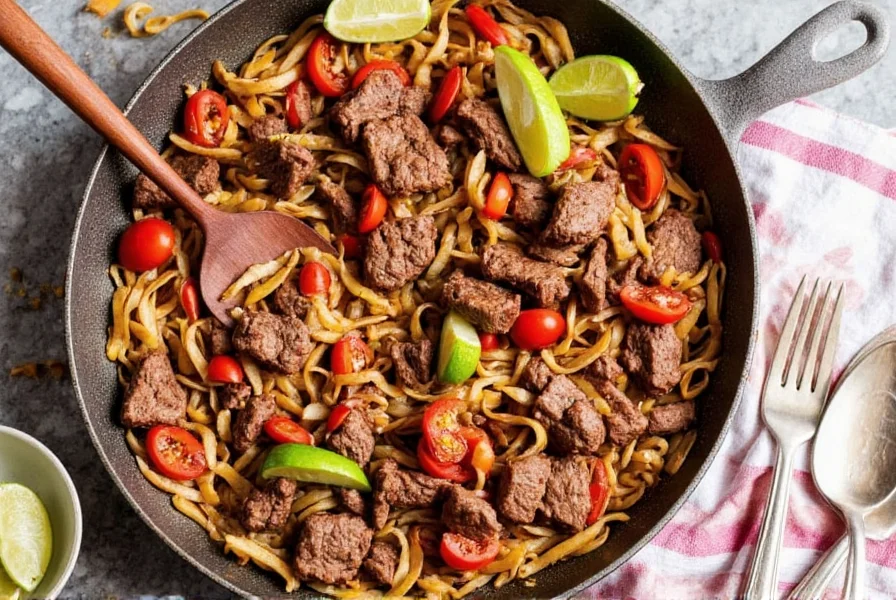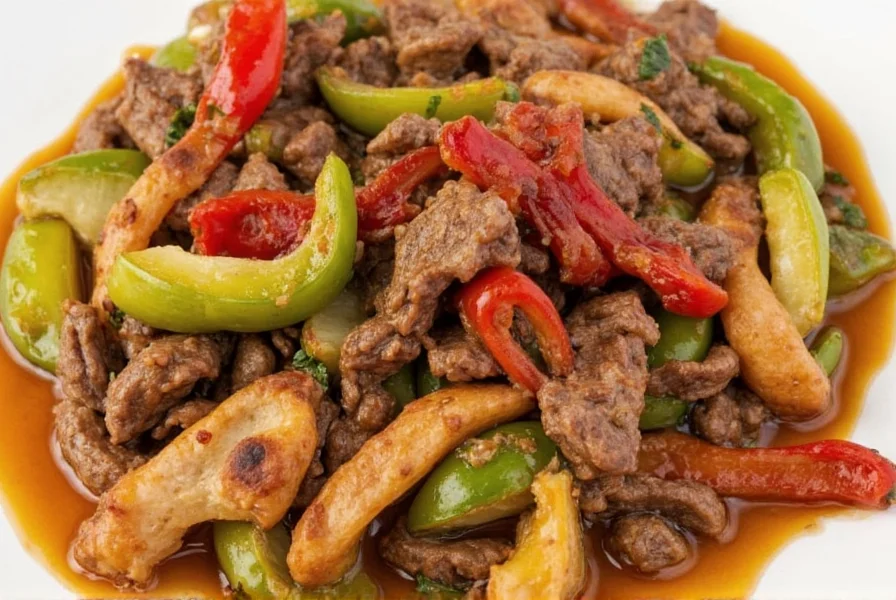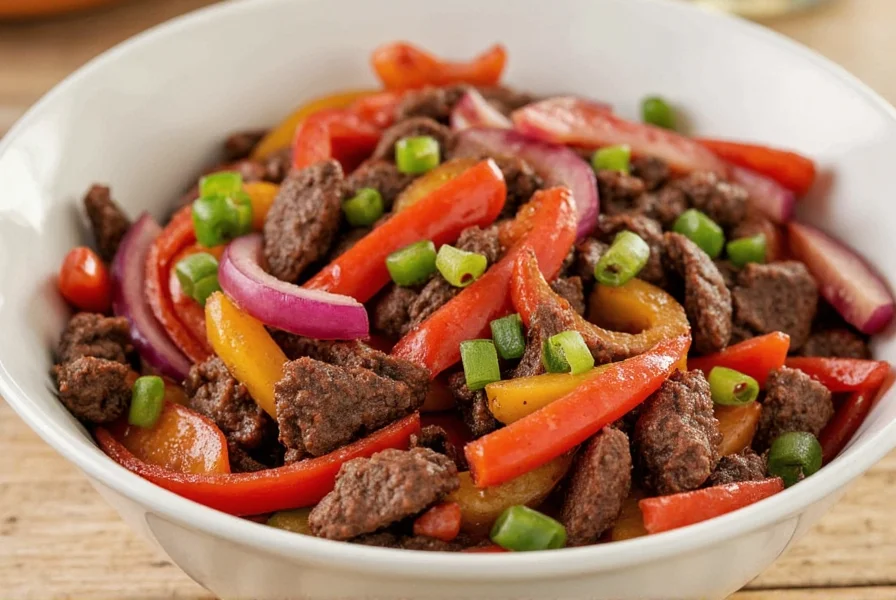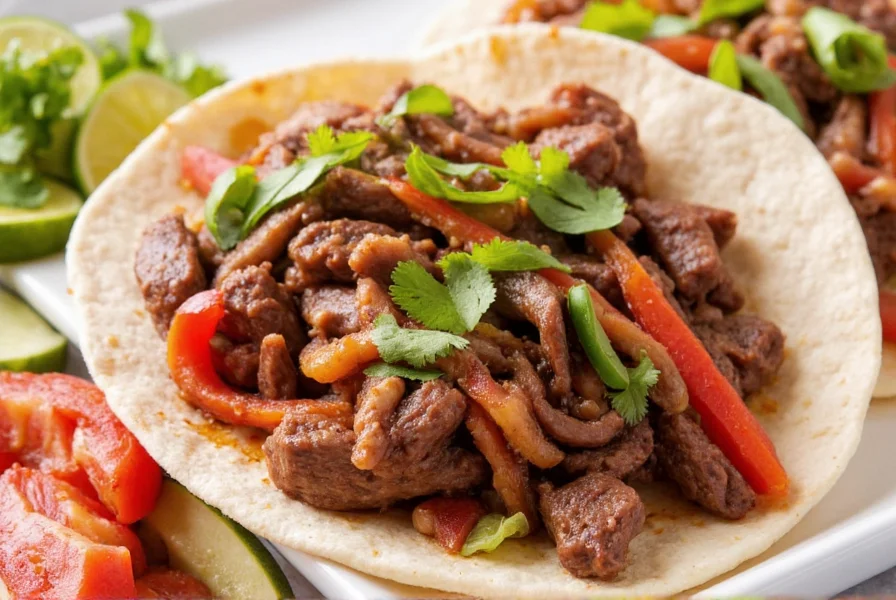Table of Contents
Ingredients
Here are the exact quantities for a perfect serving of beef fajitas (serves 4):
- 1 lb (450g) skirt steak or flat iron steak, sliced against the grain
- 2 tbsp chili powder (for authentic smoky flavor)
- 1 tbsp ground cumin
- 1 tsp garlic powder
- 1/2 tsp smoked paprika
- 1 tbsp olive oil
- Juice of 1 fresh lime
- 1 large yellow onion, thinly sliced
- 2 bell peppers (mixed colors), sliced into 1/4-inch strips
- 8 flour tortillas (10-inch size)
- Salt and black pepper to taste
- Optional toppings: fresh cilantro, guacamole, salsa, sour cream
Step-by-Step Instructions
- Marinate the beef: In a bowl, combine chili powder, cumin, garlic powder, smoked paprika, olive oil, lime juice, salt, and pepper. Add steak slices and toss to coat. Marinate for 30 minutes at room temperature (or up to 2 hours in the refrigerator for deeper flavor).
- Prepare vegetables: Heat a large skillet or grill pan over high heat. Add a small amount of oil, then sauté onions and bell peppers for 5-7 minutes until crisp-tender. Remove from heat and set aside.
- Cook the steak: Return skillet to high heat. Add marinated steak in a single layer (cook in batches if needed). Sear for 3-4 minutes per side until well-browned but still juicy. Avoid overcooking to maintain tenderness.
- Rest and slice: Transfer steak to a cutting board and let rest for 5 minutes. Slice against the grain into thin strips for maximum tenderness.
- Warm tortillas: Wrap tortillas in a damp paper towel and microwave for 30 seconds, or heat directly on a dry skillet for 15 seconds per side. Keep warm in a clean kitchen towel.
- Assemble and serve: Fill warm tortillas with steak and vegetables. Top with fresh cilantro, guacamole, or salsa. Serve immediately for best texture.
| Spice | Origin | Flavor Profile | Best Use in Fajitas |
|---|---|---|---|
| Chili Powder | Mexico | Smoky, slightly sweet | Essential base for authentic flavor |
| Cumin | Mexico | Earthiness, warmth | Enhances depth without overpowering |
| Garam Masala | India | Warm, aromatic | Use 1 tsp for Indian fusion twist |
| Coriander | India | Lemony, citrusy | Add 1/2 tsp to balance heat |
| Red Pepper Flakes | Italy | Heat, tangy | Use sparingly (1/4 tsp) for mild kick |
| Lemongrass | Thailand | Citrusy, herbal | Finely chop 1 stalk for marinade |
Global Variations
While the classic Mexican style is foundational, these global twists add exciting diversity:
- Mexican Classic: Use only chili powder, cumin, garlic, and fresh lime. Serve with warm corn tortillas and pico de gallo.
- Indian Fusion: Replace chili powder with 1 tbsp garam masala and add 1 tsp turmeric. Finish with fresh cilantro and a dollop of yogurt.
- Thai Style: Add 1 tbsp fish sauce and 1 tsp chili paste to the marinade. Garnish with sliced Thai basil and lime wedges.
- Italian Twist: Use oregano and basil instead of cumin. Top with grated Parmesan and serve with garlic bread.

Practical Tips for Perfect Fajitas
- Best cut for tenderness: Skirt steak is ideal for its marbling and quick cooking. If unavailable, flat iron steak works well.
- Prevent soggy vegetables: Cook veggies separately over high heat with minimal oil. Slice uniformly (1/4-inch thick) and avoid overcrowding the pan.
- Marinating time: 30 minutes is sufficient for flavor; longer than 2 hours can make meat mushy.
- Tortilla flexibility: Warm in a damp paper towel for 30 seconds in the microwave. Keep wrapped in a cloth until serving.
- Heat control: For mild versions, double cumin and smoked paprika while omitting chili powder. Add heat via toppings like habanero salsa.
Frequently Asked Questions
What's the best cut of beef for fajitas if skirt steak is unavailable?
Flat iron steak is an excellent alternative, offering similar tenderness and marbling. Flank steak also works well but requires careful slicing against the grain. Avoid tougher cuts like chuck roast, which won't achieve the desired texture even with marinating.
How can I prevent my fajita vegetables from becoming soggy?
Cook vegetables separately from the meat over high heat with minimal oil. Slice them uniformly (1/4-inch thick) and avoid overcrowding the pan. Remove them from heat while still crisp-tender—they'll continue cooking from residual heat. Pat vegetables dry before cooking to prevent steaming.
Which global spice blend creates the most authentic Mexican flavor?
For authentic Mexican flavor, combine chili powder, cumin, garlic powder, and smoked paprika in a 3:1:1:1 ratio. Freshly squeezed lime juice added after cooking is crucial—it brightens the earthy spices. Avoid pre-made fajita seasonings containing sugar or anti-caking agents.
Can I make beef fajitas ahead of time for meal prep?
Yes—marinate the beef (max 24 hours), then store separately from sliced vegetables. Cook components fresh when serving for best texture. Assembled fajitas don't reheat well, but you can refrigerate components for 3 days. Reheat meat in a dry skillet to maintain char, and briefly sauté vegetables.
Why aren't my tortillas staying pliable when wrapping fajitas?
Tortillas crack when too cold or dry. Warm them properly: wrap in damp paper towels and microwave for 30 seconds, or heat directly over a gas flame for 15 seconds per side. Keep warmed tortillas wrapped in a clean kitchen towel until serving to maintain moisture and flexibility.
How can I balance heat levels for different spice preferences at the table?
Prepare the base recipe with moderate heat (1 tbsp chili powder), then offer customizable heat elements: mild salsa verde, medium pico de gallo, and hot habanero sauce on the side. Add cooling toppings like avocado crema and lime wedges. For non-spicy versions, double the cumin and smoked paprika while omitting chilies.













 浙公网安备
33010002000092号
浙公网安备
33010002000092号 浙B2-20120091-4
浙B2-20120091-4